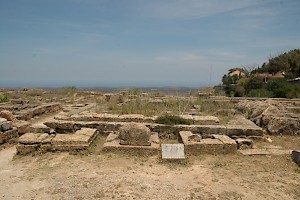Trajan's War
Roman-Jewish Wars: name of several military engagements between the Roman Republic (later: Empire) and various groups of Jews between 63 BCE and 136 CE.
The war against Trajan

The Roman emperor Trajan had decided to bring peace to the eastern borders of his empire for once and for all. Therefore, in 115 CE, he attacked Armenia and the kingdom of the Parthians. His operations were a brilliant success, and he was to be the only Roman emperor to sail on the Persian Gulf. However, after he had created new provinces - Armenia, Mesopotamia and Assyria - and believed he had been victorious, several Messianic revolts broke out similtaneously. The reasons are unclear to us, but the appearance of a comet, a Messianic symbol, may be the explanation; it is referred to in Chinese sources (and perhaps Juvenal, Satires, 6.407). The diasporic Jews of Egypt, Cyrenaica and Cyprus were among the rebels, but the newly conquered region of Mesopotamia was unquiet too.
Their revolt started in Cyrene, where one Lukuas - sometimes called Andreas - ordered the Jews to destroy the pagan temples of Apollo, Artemis, Hecate, Demeter, Isis and Pluto, and to assail the worshippers. The latter fled to Alexandria, where they captured and killed many Jews. (With a population of some 150,000 Jews, Alexandria was Judaism's largest city.) In 116, the Jews organized themselves and had their revenge. The temples of gods like Nemesis, Hecate and Apollo were destroyed; the same fate befell the tomb of Pompey, the Roman general who had captured Jerusalem almost two centuries before.
Meanwhile, the Cyrenaican Jews plundered the Egyptian countryside, reaching Thebes, six hundred kilometers upstream. The future historian Appian of Alexandria records that he made a providential escape from a party of Jews pursuing him in the Nile marshes (more...). There was nothing the Roman governor Marcus Rutilius Lupus could do, although he sent a legion (III Cyrenaica or XXII Deiotariana) to protect the inhabitants of Memphis.

Trajan sent out two expeditionary forces. One, consisting of VII Claudia, restored order on Cyprus; the other was to attack Lukuas' rebels and was commanded by Quintus Marcius Turbo. The Roman general sailed to Alexandria, defeated the Jews in several pitched battles and killed thousands of enemies, not only those in Egypt but also those of Cyrene. It is unclear what became of Lukuas, except for the fact that according to our Greek source Eusebius he had styled himself 'king' (= Messiah?). After this war, much of northern Africa had to be repopulated. The emperor Trajan and his successor Hadrian confiscated Jewish property to pay for the reconstruction of the destroyed temples.
Trajan was afraid that this revolt would spread to the Jews in the rebellious eastern provinces. Perhaps, there was some cause for his anxiousness. After the end of the revolt in Mesopotamia, someone had written the Book of Elchasai, in which the end of the world was predicted within three years. Of course, Trajan did not read this book, but he may have sensed that the Jews remained restless.

Therefore, he ordered the commander of his Mauritanian auxiliaries, Lusius Quietus, to clean the suspects out of these regions. Quietus organized a force and killed many Cypriote, Mesopotamian and Syrian Jews - in effect wiping them out; as a reward, he was appointed governor of Judaea. (He is one of the few blacks known to have made a career in Roman service.) He was responsible for a forced policy of hellenization; in response, the rabbis ordered the Jewish fathers not to teach their sons Greek (Mishnah, Sota 9.14).
Meanwhile, Trajan had reached his military aims and returned home. On his way back, he fell ill, and not much later, he died (8 August 117). His successor Hadrian gave up the newly conquered countries and dismissed Lusius Quietus, who was killed in the Summer of 118.